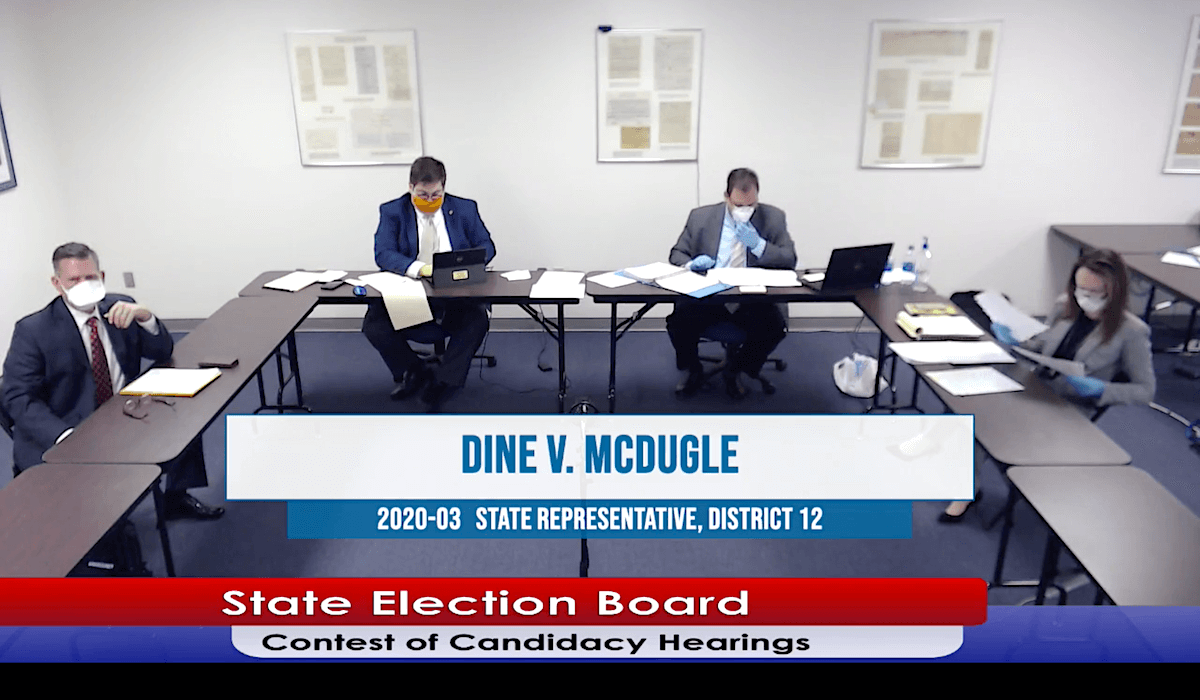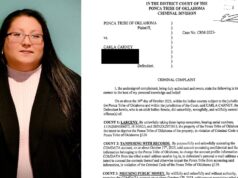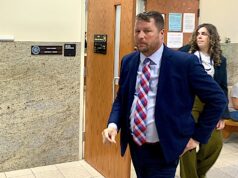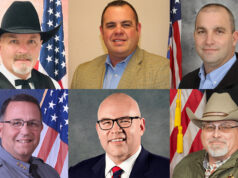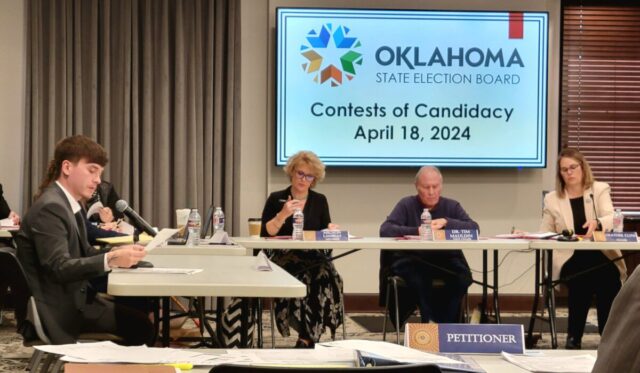

Two Oklahoma House members will have to campaign to keep their seats after the State Election Board ruled unanimously Thursday that their challengers can stay on the ballot.
The three-member board voted unanimously that Rep. Ken Luttrell (R-Ponca City) failed to provide enough proof to toss out the candidacy of independent Carter Rogers of Fairfax. Luttrell, who is seeking his sixth and final two-year term because of 12-year legislative term limits, claimed Rogers had relinquished his Oklahoma voter registration because he had moved to Colorado four years ago and registered as a voter there.
Similarly, Rep. Clay Staires (R-Skiatook) lost his bid to have the board throw out the candidacy of Libertarian Kenneth Blevins of Sand Springs. Staires argued that Blevins had failed to get enough registered voters from House District 66 to sign a petition supporting his candidacy, a mechanism for ballot access that avoids the $500 filing fee for seeking the post.
Had the board upheld their petitions, Luttrell and Staires, who was elected to the House in 2022, would have been reelected automatically. Instead, Luttrell will face Rogers and Staires will face Blevins in the Nov. 5 general election.
During Thursday’s hearings, Luttrell and Staires were represented by A.J. Ferate, an Oklahoma City attorney and a former chairman of the Oklahoma Republican Party. The two challengers represented themselves. Both appeared nervous, stumbling and hesitating at times as they presented information. But they were exuberant after the board ruled in their favor.
“I think it’ll be fun to see what a 70-year-old GOP incumbent can put up against a young, 22-year-old looking to unseat him,” Rogers said after the vote. “I’m looking forward to running alongside of him and seeing what kind of conversations we have out there on the campaign trail.
“The burden of me removing that (voter) registration isn’t on me as a citizen, it is on the state, and so I think it’s a very good decision, and I’m feeling very good about it.”
For Luttrell, the decision means gearing up for a campaign to retain his House District 37 seat, which he first won in 2006 as a Democrat. In 2010, he lost to Republican Steve Vaughn by fewer than 500 votes. In 2018, he challenged Vaughn as a Republican and reclaimed the seat.
“I’m disappointed that the Election Board did not see things legally the same way my attorney and I did in interpreting whether or not you can hang onto an Oklahoma voter registration while you’re registered in another state and voting in another state,” said Luttrell, a Cherokee citizen who co-chairs the Legislature’s Native American Caucus. “I certainly will abide by their decision, and I told my opponent I look forward to some lively and spirited debate and gave him best wishes.”
After enduring Staires’ effort to remove him, Blevins said he was appreciative of the board’s vote, which came after about four hours of testimony, most of which involved reviewing signatures on the petitions.
“It was a toss-up there,” Blevins said. “I knew it was close, but I put in a lot of hard work trying to get it, and I’m glad I’m on there. It’s going to be fun come November trying to get out there and spreading the word of liberty and trying to get as many votes as I can.”
Staires, seemingly surprised by the board’s action, declined to comment.
For Ferate, it was a long, frustrating day.
“Yeah, I mean, this board has always had a proclivity to want to keep people on the ballot,” he told NonDoc. “It’s not surprising that they wanted to try to keep people on the ballot, but it’s surprising how they did it here.”
Oklahoma not notified of Colorado voter registration
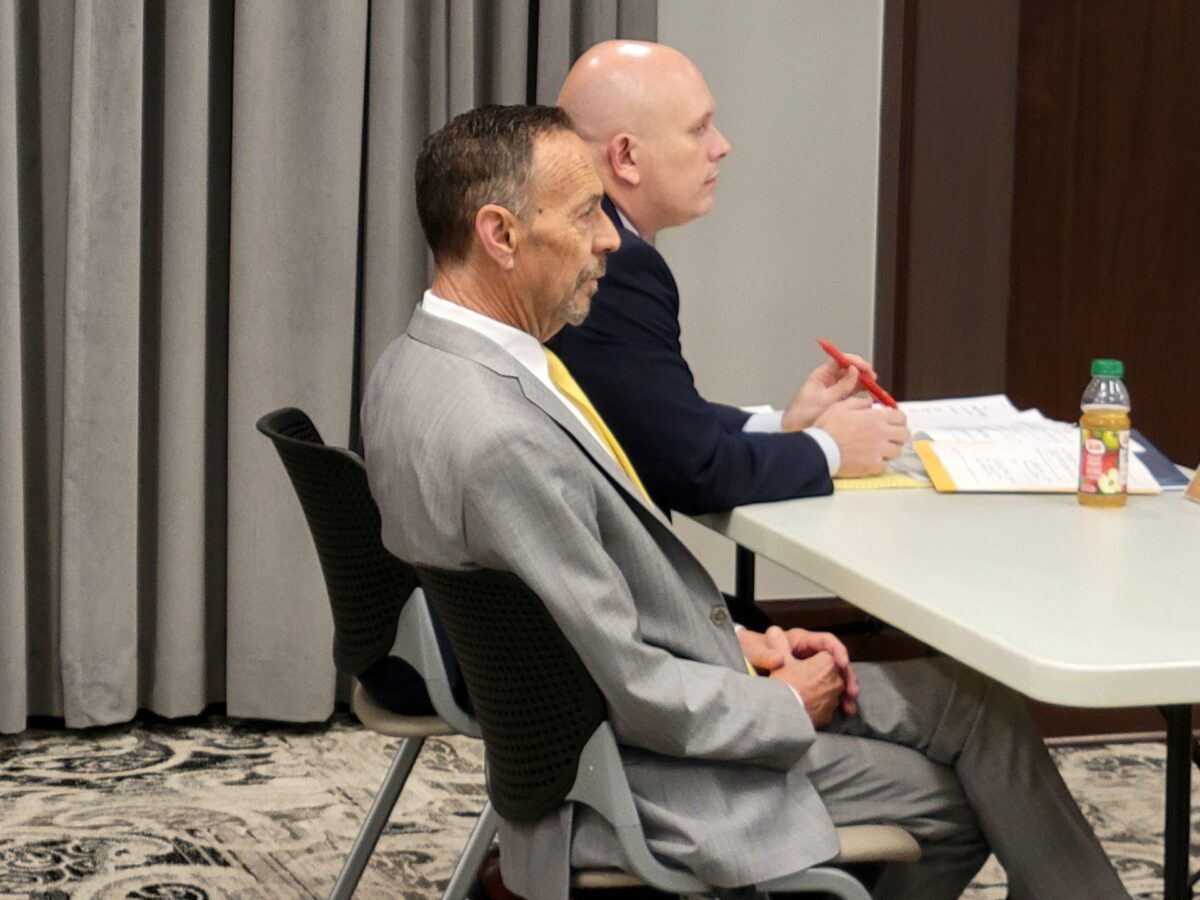
Luttrell challenged Rogers’ status as a registered voter in Oklahoma. Rogers registered to vote Feb. 19, 2020, in Fairfax, and he voted in that year’s presidential primary and June state primary. He also applied in October for an absentee ballot but he never submitted it, Ferate said.
However, before Rogers applied for the absentee ballot, he registered to vote in Colorado’s La Plata County on Oct. 13, 2020, Ferate said. In January 2023, Rogers, a student at Fort Lewis College in Durango, sought a seat on the Durango City Council. He did not win.
Rogers said he checked a box on his Colorado voter registration papers that indicated he was a registered voter in Oklahoma. In 2023, after his grandmother died, Rogers returned to Fairfax and moved back into his prior residence.
A website developer for the Osage Nation, Rogers said he checked his Oklahoma voter registration and discovered he was still registered, but he said the system listed him as inactive because he had not voted in Oklahoma since June 2020. In January 2024, he canceled his voter registration in Colorado.
Ferate argued that Rogers should have re-registered to vote in Oklahoma. He said by registering to vote in Colorado, Rogers had voided his Oklahoma voter registration.
He cited Title 26 Section 4-120 of state law that the registration of any voter shall be canceled if the voter registers in another county or state.
But Deputy Attorney General Niki Batt, who was serving as the Election Board’s counsel, said another section of state law, Title 26 Section 4-120.6, states that a person’s Oklahoma voter registration can only be canceled when the secretary of a county election board receives notice that the person is registered to vote in another county or state.
Colorado election officials in La Plata County apparently never mailed Rogers’ voter registration to election officials in Osage County.
“What I can tell you is that had Oklahoma received a notification from Colorado that Mr. Rogers had registered to vote there, there’s a procedure in place that would have ultimately led to his removal as a voter in the state of Oklahoma,” Election Board Secretary Paul Ziriax said after the hearing.
Election Board Chairwoman Heather Cline said without that information from Colorado, there was no reason to remove Rogers from Oklahoma’s voter records.
“And even though Oklahoma, I believe, is the gold standard for elections, we don’t control how other states handle their voter rolls,” she said.
Luttrell said he is concerned that Oklahoma didn’t receive Rogers’ voter registration information from Colorado.
“I think there needs to be something done to improve those lines of communication state to state,” he said. “It was certainly my opinion that you can’t have dual voter registration and have your registration in Oklahoma continue in perpetuity until you decide to come back to the state and use it.”
‘I would have petitioned harder’
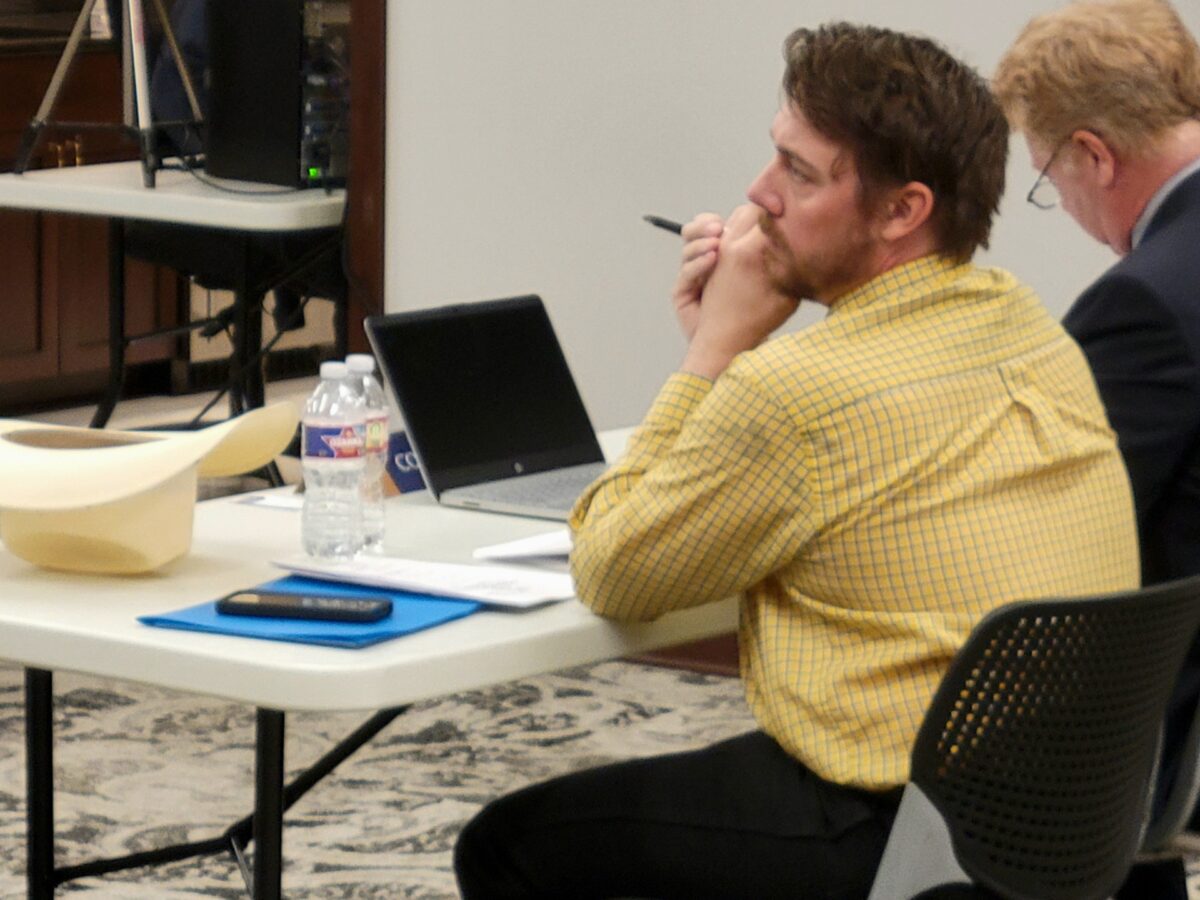
In Staires’ House District 66 challenge against Blevins, Ferate called on Josh Kraft, a campaign consultant from Sand Springs, to review signatures Blevins had collected on his petition for candidacy.
Ferate said Title 26 Section 5-112 states that candidates not wanting to pay the filing fee must submit a petition containing the names of not fewer than 2 percent of the number of registered voters “in the district, county or state, as appropriate for the office sought.”
For the House District 66 seat, Blevins needed to have 438 signatures of qualified voters, Ferate said. Blevins turned in petitions 528 signatures, Ferate said.
Kraft said his review showed that 85 signatures were not valid mostly because they were ineligible or were not found in the Election Board’s voter file. During the hearing, it was discovered that one person actually was a registered voter and that three names to be disqualified were listed twice, reducing the number of questionable signatures to 81.
Blevins called on Oklahoma Libertarian Party Chairman Chris Powell, who said he reviewed Kraft’s review of signatures and by using various “internet tools” discovered that 47 of those names actually were registered voters according to Election Board voter records. That would be enough to meet the threshold of registered voters, he said.
The petitions contained language advising people who signed them were stating they were verifying their names and addresses were accurate, Powell said.
Cline said the burden was on Staires to prove the signatures were invalid, and board members didn’t feel like he met that objective.
“And if you look at the declaration of candidacy and the sworn affirmations that are on there with the requisite signatures, I think that speaks for itself,” she told NonDoc.
Toward the end of the hearing, board member Mignon Lambley asked Blevins whether, knowing what he knows now, he would have preferred to pay the $500 filing fee.
“Knowing what I know now, I would have petitioned harder. This wasn’t just about getting on the ballot,” Blevins said. “This is about showing everyday people that they can be a part of this election process and be a major change in the way that we legislate and be a part of, you know, representing themselves and, you know, their neighborhoods in their communities. A lot of people don’t have the money (to file).”
Sen. Chris Kidd, Rep. Kevin McDugle file for final terms but withdraw
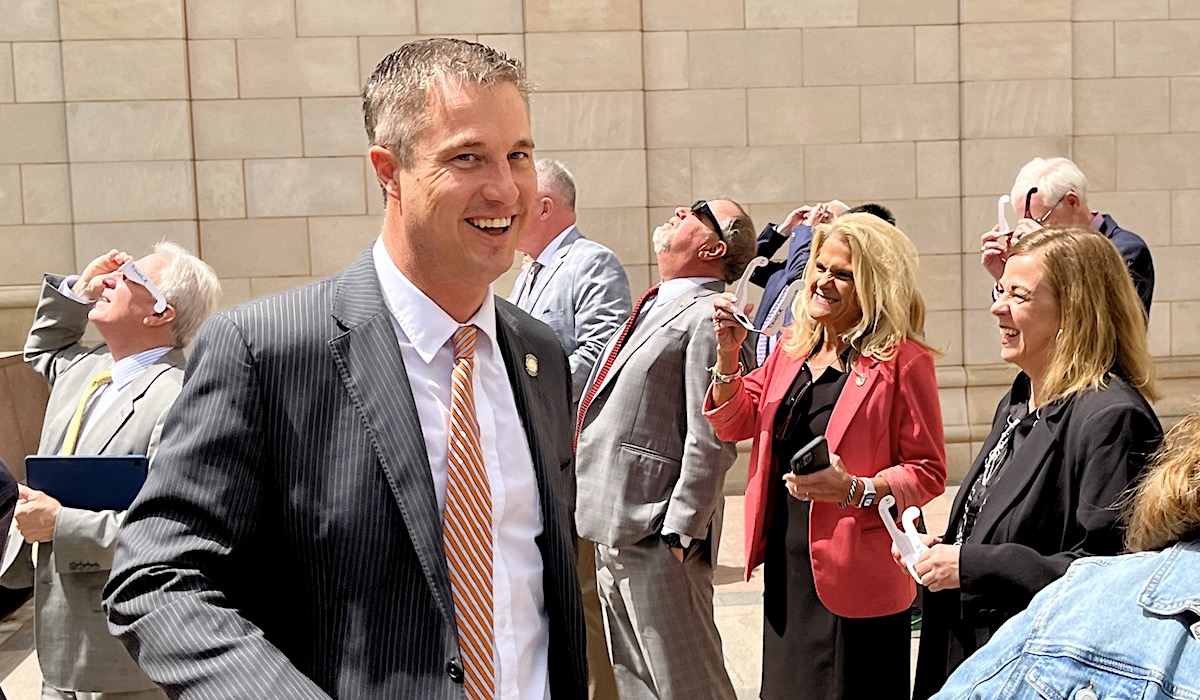
Two weeks prior to Thursday’s contestation of candidacy hearings, a representative whose 2020 candidacy was upheld following a bizarre hearing suddenly withdrew from this year’s ballot.
Rep. Kevin McDugle (R-Broken Arrow) chose to forego his sixth and final term representing House District 12 in the Legislature. In announcing his withdrawal, he endorsed fellow Republican filer Mark Chapman, a friend from his church.
“He and I had been talking for a long time,” McDugle told NonDoc. “So after I filed, he called and said, ‘Hey, I think I’m interested in doing this,’ and I said, ‘Well, put your name on the ballot. Go get it on, we’ll pray about it over the weekend, and we’ll decide on Sunday.’ When he called and said he was definitely interested, I was like, ‘Yes!’ So that’s when I decided to pull out the next day.”
McDugle’s withdrawal handed Chapman the Republican nomination in the conservative district, setting up a November challenge with Democrat Crystal LaGrone, who ran and received only 23.8 percent of the vote against McDugle in 2022.
McDugle’s decision raised eyebrows among some Oklahoma political observers, but he pushed back on the idea that his decision was premeditated to limit competition for Chapman.
“It was open 100 percent for anybody who wanted to run,” he said. “So if they wanted to run, they could have put their name on the ballot. Those who chose not to for whatever reason, that was their decision. But anybody could have run at any time.”
FROM 2020
After bizarre hearing, Rep. Kevin McDugle stays on ballot by Tres Savage
McDugle was not the only incumbent who abruptly withdrew from his reelection effort. In southwest Oklahoma, Senate District 31 suddenly became an open race following the withdrawal of Sen. Chris Kidd (R-Waurika), who said he needs to pursue a job that pays a better salary than $47,500.
“It breaks my heart, because I love serving the people of District 31. It truly breaks my heart, and I don’t want to leave,” Kidd said. “But with a growing family and the salary a legislator makes, you have to have some other source of income or another job, and if you do that I don’t know how you can fulfill your duties to serve as a senator if you have another job, because this is more than a full-time job, despite what some people may think.”
Kidd said he “was able to make it work for eight years” but needs to help his father more on the family ranch and “find something else to pay the bills.” He endorsed Republican Spencer Kern over Pamala McNall-Granier and Rick Wolfe in the Republican primary, the winner of which will replace him.
But Kidd’s withdrawal did not come without controversy. SD 31 residents with whom he has clashed visited the Capitol to question Kidd’s residency and confront him over homestead documents. A friend of the people who confronted Kidd sent NonDoc clips of recordings of the encounter.
“I live in Claypool, Oklahoma. You are welcome to come there, and I will offer you a drink and a nice place to sit and give you a lesson in telling the truth,” Kidd said at one point.
Days later, Kidd told NonDoc he filed for reelection but withdrew and endorsed Kern because he wanted “to make sure I had someone that I felt comfortable with.”
(Correction: This article was updated at 10:55 a.m. Friday, April 19, to correct references to Josh Kraft. It was updated again at 6:05 p.m. Tuesday, April 23, to correct a quote from Kidd about his residence.)








